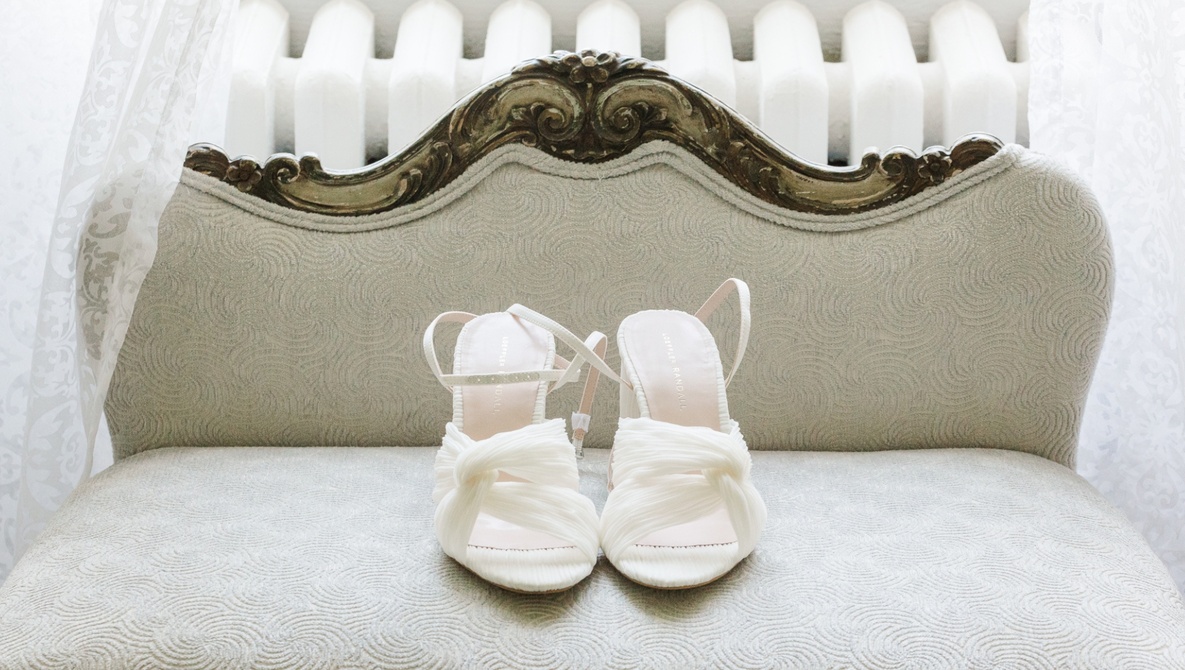Photographers are often asked about their “worst bridezilla” stories. My answer is always the same: I don’t use that term. I don’t appreciate its sexist origins, and I don’t believe it reflects reality. The bridezilla stereotype paints brides as self-centered, high-maintenance figures on their wedding day. In truth, the behavior people label this way is often the product of immense stress and societal expectations, especially in cisgender, heterosexual relationships.
Where the Bridezilla Trope Comes From
The term “bridezilla” rose to popularity through early reality TV and tabloid culture. These shows thrived on portraying brides as unreasonable and demanding, often without showing the months or years of planning that led to those moments.
Taking on Stress and Responsibilities for Both Parties
This narrative has long been disproportionately applied to women, reinforcing the idea that they are controlling while their grooms are laid-back and easygoing. It glosses over the reality that wedding planning responsibilities are rarely split evenly and often fall primarily on the bride.
The Pressure Cooker of Wedding Planning
Planning a wedding is a logistical and emotional marathon. Couples are caught between their own vision for the day and the expectations of their families and friends.
Parents—especially those contributing financially—often feel entitled to have their say. Some treat the wedding as a family reunion, pushing for a much larger guest list than the couple wants. Others insist on inviting people the couple barely knows, believing it’s “the right thing to do.”
The Support System Needs Supporting
Friends, while supportive, can add to the stress. They expect regular updates, but they also have their own expenses and schedules to manage. Many don’t realize how much of the work and coordination falls on the couple.
When Community for the Couple Is Missing
Not every couple has a strong support system during wedding planning. For those marrying later than peers, friends may be busy with families or careers and less invested in wedding events. Parents may be uninterested or even disapprove of the marriage.
An Isolating Wedding Planning Process
This can make the process deeply isolating. Without people to share the excitement (or the workload), planning feels like a heavy burden rather than a joyful journey. These couples still deserve a meaningful, well-supported celebration. Lack of external enthusiasm doesn’t make their wedding any less significant.
The Unequal Burden on Women
Even in partnerships that consider themselves modern and equal, the wedding planning load often defaults to the bride. Cultural expectations reinforce this imbalance. Women are expected to keep track of deadlines, coordinate with vendors, and manage details while continuing to meet work and personal commitments.
Outdated Jokes and Tropes Reduce the Role of Men
Meanwhile, outdated jokes about grooms “losing their freedom” trivialize their role in planning. Some grooms lean into the idea that their partner is “better at planning,” sidestepping involvement altogether. The truth is that neither may have the experience to take on such a huge project, but women are still expected to pull it off without showing strain.
Why 'Just Elope' Isn’t the Answer
Elopements can be beautiful, intimate, and stress-free—but they aren’t the right choice for everyone. Many couples genuinely want a big celebration with family and friends. They want their favorite people in one place, witnessing a major milestone in their lives.
Couples Deserve to Celebrate Their Milestones
Dismissing this desire as unnecessary or frivolous overlooks the importance of cultural, religious, and personal traditions. For many, a wedding is more than a party. It’s a meaningful ritual that marks the start of a shared life.
Who Really Creates Tension on Wedding Days
Contrary to the stereotype, the most challenging personalities on a wedding day are rarely the couple themselves. More often, tension comes from family members or guests who feel entitled to make changes or offer unsolicited advice.
Too Many Cooks in the Kitchen
Sometimes it’s a parent who disagrees with the timeline, an aunt who insists on reorganizing the seating chart, or a friend who undermines the professionals hired to manage the day. These individuals may have had little involvement in planning, yet they arrive ready to exert control.
Understanding the Breaking Point
When a bride shows visible frustration or becomes short-tempered on her wedding day, it’s rarely about a single incident. It’s the result of months to years of managing expectations, negotiating compromises, and navigating family politics.
Tipping the Scales to the Point of Overwhelm
She has coordinated with multiple vendors, tracked payments, managed guest RSVPs, and worked tirelessly to create an event where everyone feels included. This is on top of her personal and professional responsibilities. A small disruption or thoughtless comment can be the thing that tips the balance. This isn’t selfishness—it’s a natural reaction to prolonged stress.
What Wedding Photographers Can Do to Help Couples
As photographers, we have a unique role on wedding days. We are not just documenting events; we are also part of the couple’s support system. By approaching our work with empathy, we can reduce stress and help create a calmer environment.
You're Hired to Deliver a Quality Service With Humanity
Arriving early, checking in frequently, and being flexible when plans shift shows the couple that you’re on their side. Offering gentle direction during portraits, keeping an eye on timelines, and shielding them from unnecessary interruptions can make a significant difference in their experience.
Small Actions Make a Big Impact
Little things matter. Helping a bride with a veil, quietly fixing a boutonniere, or grabbing a drink for the couple during a break all show that you care about their comfort. These moments often become part of what couples remember most about their vendors.
Help Couples Stop to Take in the Moment
Sometimes, the most valuable thing you can do is give them space to breathe. Suggest a short walk together between events or a few quiet moments away from the crowd. These pauses can help them reset and fully enjoy their day.
Choosing Empathy Over Judgment
The next time someone asks you about a “bridezilla,” challenge the narrative. Think about the layers of stress that build up during wedding planning and how societal expectations shape who bears that burden.
Approach your couples with compassion.
Recognize that they are trusting you to document one of the most significant days of their lives. By leading with empathy instead of judgment, you’ll build stronger relationships and capture moments that reflect the depth and humanity of their experience.









I've shot 2000 wedding in 29 years. No bridezillas yet. I have had some pretty wild experiences with the parents though.
In the 15 years I've shot weddings -- Mother of the Bride is without fail always the main source of drama. Only ever had one bridezilla and it was the last bride I expected to be like that day of. She was so chill in all the meetings before.
I've also had the Groom go from disinterested and chill to frantic mess day of while his bride was totally chilled out (because she planned...everything and was like "well if something goes wrong, I did what I could" .
Isn't the entire wedding tradition largely sexist and centered around the bride?
A whole bunch of years ago, I shot two weddings and swore that I'd never do it again. The couples were always wonderful to deal with. The problem was always the MOB (Mother of the Bride), EVERY STINKING TIME! In another case, I was the best man when the MOB started disrupting the rehearsal. Fortunately, the chaplain addressed the issue politely, but pointedly. At the reception, the MOB announced that she was going to open all the gifts and catalog what came from whom. The bride and groom looked stunned. I told the MOB that if any of the packages were touched before the couple returned from their honeymoon, I would report her to the Postal Inspection Service, and that it was a felony for anyone other than the addressees to open packages. The groom silently mouthed "Thank you". Two weeks later, I got a call and heard the groom laughing like crazy. I asked the source of his mirth. His response was, "We just got back, and not one package had been opened." We both howled.